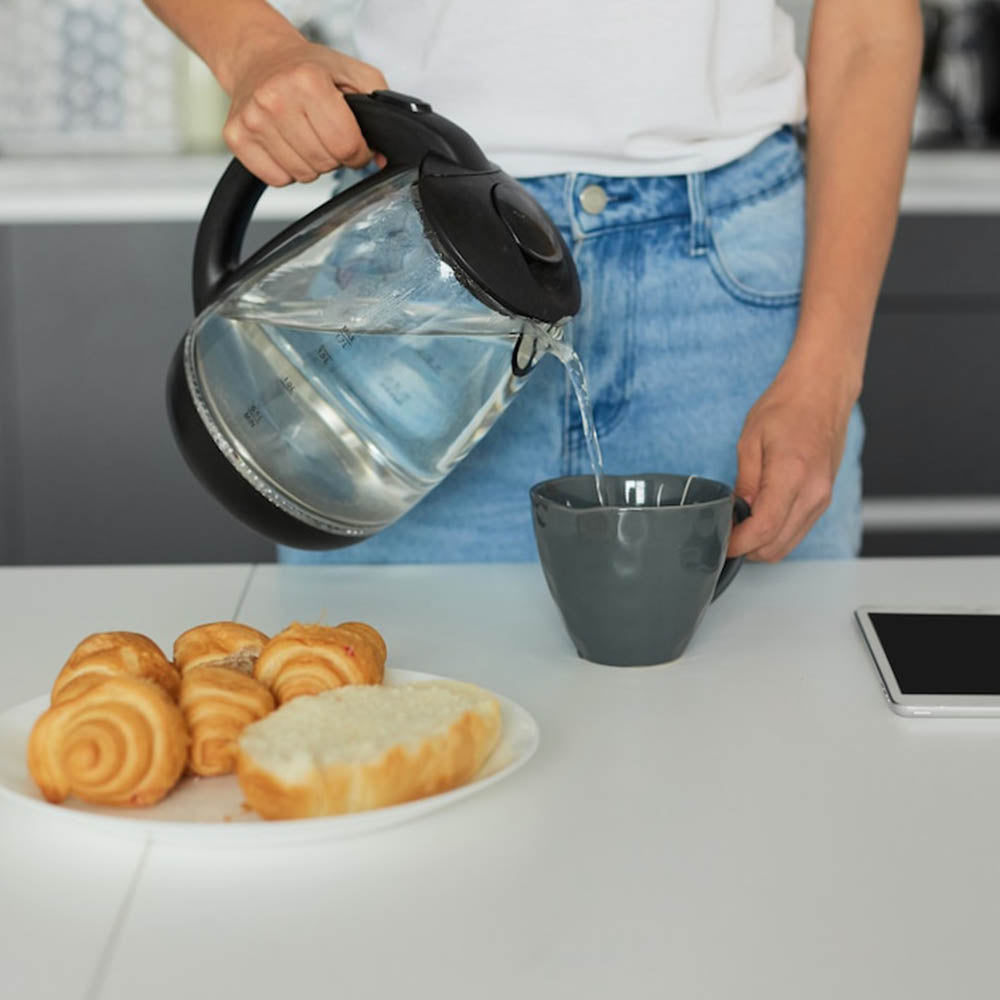
Boiling the Truth: Are Electric Kettles Safe?
Share
We've all heard the popular phrase, "Don't believe everything you hear," and yet so many of us accept the safety of boiling water kettles as a given. We assume that because kettles are widely available and commonly used, they must be safe. But is this really the case?
What is the truth behind boiling water kettles and their potential health risks? In this blog post, we'll explore what the research tells us about the safety of kettles and how boiling water can stir up more than just hot water. We'll investigate the materials used in the manufacturing of kettles, the potential health risks, and the best practices for using a kettle safely. So put the kettle on and let's dig into boiling the truth about kettles.
Boiling the Truth
Are electric kettles safe? This is the question that has been on the minds of many consumers in recent years. It’s no wonder - electric kettles have become a popular kitchen appliance, and with media reports of exploding kettles, people have just become concerned about their safety. In this article, we'll explore the truth behind electric kettles to determine whether they are indeed as dangerous as some reports suggest.
We'll investigate what causes kettle explosions, review safety regulations for these appliances, and look at current research into their potential risks. By the end of this article, you should have all the information you need to make an informed decision about whether electric kettles are safe for your home and family.
Research: Health Concerns
Recent research has highlighted the potential health risks associated with electric kettles. A study conducted by an independent consumer watchdog organization found that using electric kettles can potentially expose individuals to dangerous levels of lead, cadmium, and other toxic chemicals.
Long-term exposure to these materials can have a detrimental impact on human health, including damage to organs, such as the heart and brain, reproductive issues, and even increased risk for certain cancers. As a result of these findings, it is crucial for consumers to be aware of the potential risks and take steps to protect themselves from harm.
This article delves into the issue at hand by exploring the safety of electric kettles.
Investigating Materials
Investigating Materials: Are Kettles Safe?
Recent reports of dangerous materials used in the production of kettles have raised a lot of questions about the safety and reliability of these appliances. With this in mind, it's important to take a closer look at the materials utilized in their manufacture, as well as what might happen if those components come into contact with boiling water.
It is widely known that many kettles are made with plastic parts, while some contain metals such as aluminum or stainless steel. But not all plastics or metals are created equal when it comes to their suitability for use around hot liquid. For instance, certain types of plastic can leach chemicals into boiling water, while metal components may corrode if exposed to high temperatures for too long.
Controversial Kettle Components
Kettle Components with a Notorious Reputation
Kettle Components with a Notorious Reputation
Kettles have been around for centuries, but is the convenience of boiling water worth the potential safety risks? Recent reports of kettle malfunctions and accidents have put the safety and reliability of kettles into question. From faulty wiring to melting plastic components, kettles can be dangerous when not properly maintained or made with inferior materials. Take a look at some of the most notorious kettle components that you should look out for.
The power cord connecting your kettle to electricity is one component that needs extra attention. Faulty wiring can cause fires, shock, and even electrocution if not checked regularly. Plastic components such as handles and switches are also known to cause problems when they are heated too quickly or exposed to excessive amounts of heat over time.
Surprising Facts about Kettles
Kettles have been a staple of homes for centuries, providing hot water for tea, coffee, and other meals. For years, the safety and efficiency of kettles have been widely assumed; however, there are several surprising facts about these devices that may shock even the savviest consumer. Boiling the Truth: Are Kettles Safe? will explore some of the lesser-known aspects of this common household item.
It turns out that some kettles contain materials, such as plastic components and leaded solder joints, which can leach into boiling water if not used properly or maintained regularly. Furthermore, many modern electric kettles draw more electricity than traditional models in order to heat up faster – meaning your energy bills could be significantly higher than expected.
The Debate Over Kettles and Their Components
Kettles have been used for centuries to boil water, yet the debate over their safety and components continues today. With health concerns about the potential dangers of plastic kettles and the unknown contents of metal kettles, consumers are left wondering which is best for their lifestyle. Recent studies have shown that both plastic and metal kettles can be equally safe, depending on the proper maintenance of each product.
The main issue surrounding plastic kettles lies in the presence of chemicals leeching into hot water from its inner lining. If a kettle is made with Bisphenol A (BPA) or is a phthalate-containing product, then it may pose a health risk when heated.
Unusual and Controversial Kettle Parts
When it comes to kitchen appliances, the kettle is one of the most widely used pieces of equipment. But recently, unusual and controversial parts have been making headlines, raising safety questions among consumers. From potentially dangerous plastic components to questionable electrical performance, these new products are causing a stir in the industry.
The issue first came to light when Consumer Reports released a report indicating that some kettles contain plastic parts with unsafe levels of BPA (Bisphenol A). This chemical has been linked to various health problems such as cancer, infertility, and diabetes. In response to this news, many companies have removed any trace of BPA from their kettles. However, questions remain about other non-BPA-related materials that can still leach into boiling water.
Should We Be Wary of Kettle Materials?
Kettles are commonplace in most kitchens, and for good reason. They provide a convenient way to boil water for tea, coffee, or other beverages. But are we being careless with our kettle materials when it comes to safety? This article examines the potential dangers of using kettles made from different materials.
When you purchase a kettle, you should be aware of its contents and consider whether it is safe for use. Some popular types of material used in kettles include stainless steel, plastic, ceramic, and aluminum. The best option is usually stainless steel because it is durable and free from toxic substances such as BPA or PVC. However, some plastics may contain these compounds which can leach into your drink over time if they come into contact with boiling water too often.
Examining the Risky Side of Kettles
When it comes to boiling water, kettles have become a kitchen staple. But before you reach for that kettle, it’s important to understand the risks associated with them. A new article, Boiling the Truth: Are Kettles Safe? examines the potential hazards of using kettles in households around the world.
The article dives into some unexpected facts about kettles and their impact on our health and safety. From scalding water to faulty wiring, there are many risks that can come from using these appliances improperly or without proper maintenance. It also looks at how certain materials used in making the kettles can leach harmful toxins into your cup of tea or coffee. The conclusions drawn from this article will help readers make more informed decisions about selecting and using a safe kettle for their home needs.
Examining Regulations
The debate over the safety of electric kettles has been raging for some time now. A recent investigation into certain kettle models has raised questions about their safety and how they comply with existing regulations. This article will take a closer look at the issue to determine whether these products are really as safe as manufacturers claim them to be, or if stricter regulations should be put in place.
When it comes to electric kettles, stringent industry standards must be met in order for them to pass inspection and receive certification from relevant bodies. However, this does not necessarily guarantee the product’s overall safety, and potential risks posed by faulty components or design defects can still exist. Therefore, it is essential anyone looking for an electric kettle takes care to check any certification labels on the product before the purchase in order to ensure that everything is up-to-date and compliant with current regulations.
Consumer Discretion
When brewing hot drinks, it is natural for consumers to take precautions. With so many options available on the market, such as kettles and microwaves, there has been a growing concern about their safety. In this article, we will be boiling down the truth on whether or not kettles are safe for consumers to use.
We will explore a range of factors that have an effect on kettle safety. These include materials used in their construction, water temperature levels that can safely be reached with them, and overall design features which allow for quick brewing times without sacrificing safety measures. Additionally, we will also identify what kinds of risks could arise from using these appliances and how they can be avoided through smart use of the product.
Conclusion: Boil Safely
In the article "Boiling the Truth: Are Kettles Safe?", we discussed how kettles and other boiling appliances may contain harmful toxins in their plastic components. We also discussed ways to reduce exposure to these toxins by using a stainless steel kettle or boiling water in an enamel-coated pot. In conclusion, it is best to boil safely and be aware of potential contamination with any type of appliance used for boiling.
Ensuring that your kettle or pot is made from high-quality materials and refraining from overfilling can help prevent exposure to potentially dangerous chemicals. Additionally, if possible, consider investing in a stainless steel kettle as they have fewer health risks associated with them. Regularly cleaning your appliances will also decrease the risk of consuming contaminants while drinking boiled liquids.
